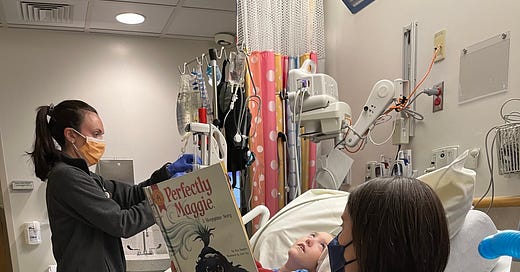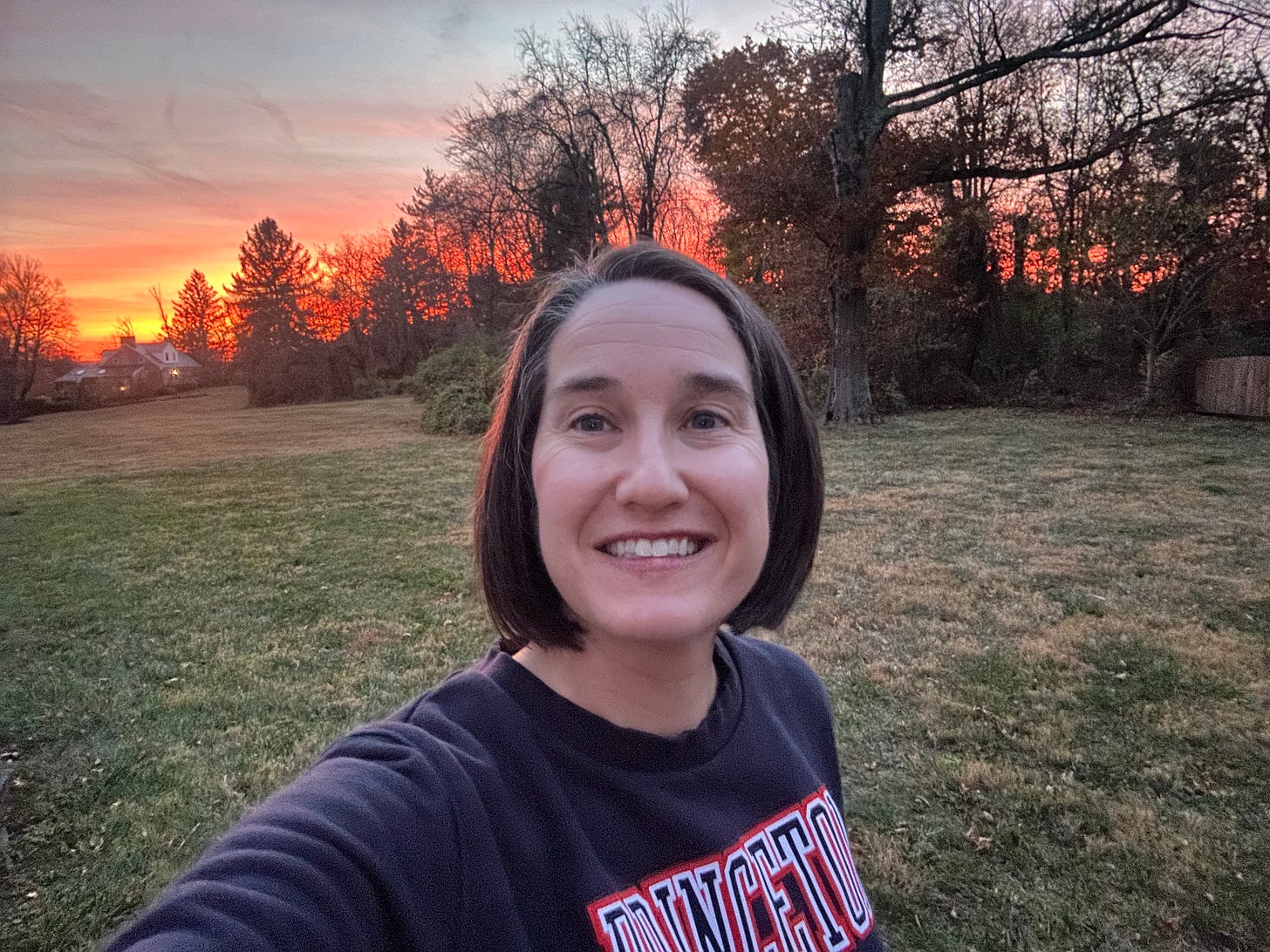Listening to God's Story
Leaning into struggle, away from anxiety, and believing the truth of God's past promises
I’ve been telling anyone that will listen this semester that I’ve found my students to be inordinately anxious. The anxiety doesn’t seem founded either. They’re doing as well as any other batch of Princeton freshmen I’ve taught writing to. But I also can’t seem to soothe their anxiety either: no amount of empathy or tough love seems to make them any less anxious. And what I’ve found really frustrating is that when faced with new and challenging tasks, things they have likely never done before, they don’t seem to be able to struggle. Instead, it feels as though at the first sign of hardship, they quickly throw up their hands and panic. I’ve never heard so many “I can’ts” from brilliant young people in my life.
But a few weeks ago when Lucia was clearly experiencing pain but several trips to the pediatrician later we still weren’t able to locate the source of it, I, too, began to panic. I, too, began to throw up my hands. The voice in my head started to sound like the voices I was hearing in my classroom this semester. “I don’t know how I’m going to be able to this,” I thought, “fitting in these trips to the pediatrician alongside all the other things I’m doing.” And nested belief that fear was another even more threatening one, “What if we can’t find the source of her pain?”
Well, spoiler alert: we found it. When we ended up in the emergency room last week, they diagnosed her with appendicitis. No wonder she was consistently nodding to say it was her stomach that hurt, and she was in pain! She had an emergency appendectomy, and unfortunately, they also found a mass on her liver, so now we’re waiting to hear back about that biopsy. But she’s also finally home and healing, hopefully, from all that pain.
The funny thing is that going into the hospital, especially the night after a devastating election, was not actually anxiety-inducing. For one, I think we’ve been in the hospital so many times before that Evan and I know how to snap into action. We know the drill. Another is that now we had some diagnoses—we’d done what I worried we might not be able to do, which was pinpoint the source of Lucia’s pain. Finally, of course, this gave us something important to focus on outside the election!
Photo caption: I read a book titled Perfectly Maggie to Lucia as she looks up from her hospital bed and a nurse looks on in the background.
But another reason I think going into the hospital oddly did not throw me more is because when I threw up my hands like that, God responded by reminding me that those things I was so worried about probably wouldn’t happen in the future, because God had been faithful with the past. When I found myself saying, “What if I can’t?” essentially I heard God saying, “But I can.” When everything in my anxiety was telling me to look forward with worry and disbelief, God invited me to look back at how God has kept God’s promises and made a way even when there seemed to be no way.
Now the funny thing about me is that I immediately started trying to reengineer things so I could avoid that feeling of overwhelm in the future: how can I just hang onto God’s faithfulness so I won’t ever panic again? In essence, I didn’t want to struggle. Apparently I’m more like my students than I give them credit for. But God’s promises aren’t that we won’t feel human, or that we won’t feel the struggle, but that God will show up, be with us, and make a way when there seems to be none. Getting to the end of our rope isn’t failure. It’s just really human. And even then, God promises, God won’t leave us alone.
Yesterday morning a dear friend of mine asked how I was really doing and I told her a bit about this minor miracle in my life—the fact that on the heels of Lucia’s hospitalization, not only am I not really behind on my work, I’m still happy to be doing it, and I’m not even all that daunted about the next few weeks of the semester before the holidays. I’m feeling grace upon grace upon grace.
But then I also sheepishly admitted that the thing that’s still giving me pause are the results of this election, because my body remembers the feelings of fearing for Lucia’s healthcare last time Trump was in office, the sleepless nights as I anticipated that her Medicaid might be cut by a Republican Congress, and the vigilance I felt trying to rally my friends and family to advocate for what my family needs.
Photo caption: White swamp oak stands tall in our backyard, retaining just a few of its leaves.
Yet as we talked, I also realized something else: despite the darkness of those times, many of those things I feared so deeply, like the cuts to Medicaid and the repeal of the Affordable Care Act, didn’t actually come to fruition, because courageous leaders on both sides of the aisle refused to pass legislation that would undermine my family’s care. The fear and the pain and the struggle were real, of course, but it isn’t a true story to tell myself that we were alone, or that the things I feared happened, because we weren’t alone and they didn’t happen, because God showed up, and people do care.
I suppose what I’m getting at is that when the world wants to undermine our confidence in ourselves and others, we can trust God to tell us a true story.
For instance, the story people keep wanting to tell me about Lucia’s appendicitis is that we’re so lucky we found it in time, given how hard it is to communicate with her because she’s nonspeaking and the ramifications, given her medical fragility, could have been so much worse.
But the story God is telling me is one of celebration: we can trust Lucia to communicate clearly about her body, and we can also trust ourselves and others to listen.
The story my doubts want to tell me about this experience is that maybe I should cut back at work or that my priorities are all over the place.
But the story God is telling me is that I’m right where I should be, and I can absolutely trust God to provide for what my family needs.
And finally, the story the world is telling me about this election is that it’s going to bring nothing but doom and disorder.
But the story God is telling me is that God has been and will continue working for justice alongside those in need in the world.
Photo caption: A selfie of me in front of a majestic fall sunset!
Now, that doesn’t mean I’m not going to get scared about real threats to my family or our future, of course. And none of this means that when it comes to clinical anxiety, people should just power through—instead, I believe God uses and values doctors and medicine and all avenues of support for people in need. But it does also mean that there is a counternarrative that I can trust God to be working out in the world, because I’ve seen and tasted its truth so many times before.
There was a question I added into my students’ midterm reflection letters this semester that went something like this: What was something you really struggled with in this class in the first half of the semester? How did you learn to work through it? And what can you take with you from that experience?
Maybe we can resolve to ask ourselves those same questions when we start to flail and to trust that those are the questions God may be asking us, too.
Anxiety only tells us part of the story—in the face of hardship and struggle, it looks forward with rational fear, trembling, and disbelief. My students have helped me to see and respect that their anxiety is actually quite rational, especially if it leans on their own present or future understanding. But as human beings, we also have the ability to remember the past. We have reserves. And we have God and each other. Anxiety is rational, but it also robs us of relevant countertruths that run deeper than the present and offer much more certainty than the future: God is faithful and we are not alone. As that lovely little internet meme says, all our track records for getting through bad days is actually one hundred percent.
Now, if only I could convince my students of that…






